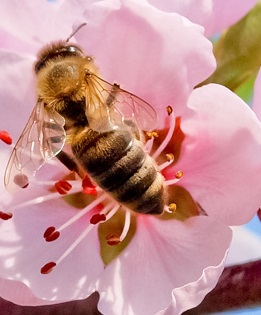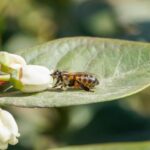Wild bees could boost blueberry production, study finds

Wild bees could be used to obtain larger and better blueberry yields, producing plumper, faster-ripening berries, according to new research by Vermont University.
The study found that wild bees have significant benefits for berry farmers, including greater berry size, quantity, size consistency, and earlier harvests by two and a half days, the university said.
“Other studies have explored bees’ effects on blueberry yields, but this is the first to show that pollinators can improve the quality of crops as well,” says Charles Nicholson, who led the study as a Ph.D. student.
The research that involved nine berry farms showed that wild bees could boost production up to 36%, or roughly US$136,000 per year, on one mid-sized berry farm alone. On other farms, researchers determined wild bees’ potential benefits to production as roughly 6% on average.
“This study highlights the undervalued work that wild bees do,” said Nicholson. “Without them, farmers need to find pollination somewhere else, by paying high rental fees to bring in honeybees, for example.”
The team hand-pollinated blueberry plants in all nine research sites – using electric toothbrushes to mimic the buzz pollination of bumblebees - and then "painted" the collected pollen on over 5,000 blueberry flowers with small brushes.
When comparing production on these flowers, one with artificial pollination, and one with natural pollination, they noted that the difference between the two conditions revealed each farm’s “pollination deficit” and the amount by which production could be improved with an increase in wild pollinators.
“Many farmers don’t realize they can be limited by not enough pollinators just like they can be limited by water or nutrients,” said Nicholson.
“This study shows, yet again, that protecting wild bee populations offers important benefits to our agricultural economy,” said co-author Taylor Ricketts, Director of UVM’s Gund Institute for Environment.
“Maintaining healthy ecosystems can be as important as providing fertilizer or water.”
The UVM team found that maintaining a high proportion of natural bee habitat around farms can help, as well as using fewer pesticides.








































